#jedi teachings
Text
Understanding the Dark Side of the Force
What is the dark side of the Force?
In Episode IV, Obi-Wan Kenobi’s definition of the Force: “an energy field created by all living things. It surrounds us and penetrates us. It binds the galaxy together.” He quickly reveals that this Force has a “dark side” which is the culprit behind the evil deeds of Darth Vader, who was seduced by it. In Episode V, Master Yoda reveals what the dark side of the Force, that seduced and consumed Darth Vader, is: “A Jedi's strength flows from the Force. But beware of the dark side. Anger, fear, aggression... The dark side of the Force are they. Easily they flow, quick to join you in a fight.” He explains, the dark side is "quicker, easier, more seductive" but it is not stronger.

"If once you start down the dark path, forever will it dominate your destiny, consume you it will, as it did Obi-Wan's apprentice. The consciousness of Obi-Wan, manifested by the Force, warns Luke, “don’t give in to hate. That leads to the dark side.” As a part of his training, Yoda sends Luke Skywalker into a cave, from which Luke feels death emanating, and what is “strong with the dark side of the Force”, which is “a domain of evil” - and inside, there will be nothing, “only what you take with you.” In Episode VI, Yoda repeats his warning, “anger, fear, aggression, the dark side are they.” In Episode I, he reveals how evil is created, identifying fear, especially the fear of losing the people we love as the origins of evil: "fear is a path to the dark side. Fear leads to anger. Anger leads to hate. Hate leads to suffering" and in Episode III, he repeats: “fear of loss is a path to the dark side." He warns against not accepting death as part of life: “attachment leads to jealousy. The shadow of greed, that is.”
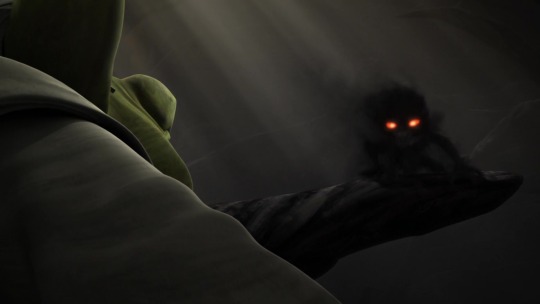
In Star Wars: The Clone Wars, there are two arcs elaborating on the dark side: the Mortis Arc and Yoda’s Arc. In Yoda's Arc, to achieve immortality, the Force Priestess Serenity instructs Yoda to face with "what in your existence some call evil, otherwise known as fear." Yoda battles with a dark creature that he can defeat only through recognizing it as his own dark side, something that is a part of himself, that is "part of all that lives." Serenity tells him afterwards, summarizing the lesson, "the beast is you and you are the beast." In the Mortis Arc, the dark side is explored as one of the two simplest parts of a cosmic construction that makes up the cosmos. The Son, himself a living being, embodies the cosmic function of destruction, death, the male line along which the form of living things develop in the womb, and selfishness, whereas the Daughter embodies the cosmic function of creation, birth, the female line along which the form of living things develop in the womb, and selflessness.
Summarizing the Dark Side of the Force
In George Lucas' Star Wars, the dark side of the Force, the energy created by all living things, surrounding and penetrating them, is part of all that lives: it's fear, anger, hate, aggression and selfishness, the culprit behind the actions and behaviors of those who we deem evil, and the causes and conditions which such behavior is the result of. "Evil" is just another name for fear, that is behind anger, which is behind hate. Fear, anger, hate and aggression are flowing very easily, arising within living things very quickly in a fight, seducing to a very easy path. However, once they give in to them, that will permanently influence how their destiny will unfold and they will consume them. Falling to the dark side of the Force is to fall under the sway of the dark side within us, causing evil and selfish behaviors towards others: fear, anger, hate, aggression. As part of a cosmic construction that makes up existence, the dark side of the Force is also the cosmic function of destruction, death, the male line along which the form of living things develop.
The Jedi Way: controlling the dark side
In Episode IV and V, Yoda and Obi-Wan are teaching Luke that "the Force is what gives a Jedi his power" and that "a Jedi's strength
flows from the Force" but they warn him to be careful with the strength and power of the dark side, the fear, anger, aggression within him, since if he gives in to their seduction and starts down on the path of fear, anger and aggression, if he gives in to hate, he will turn into "an agent of evil" and be consumed by his dark side, like Darth Vader, and it will leave a permanent mark on his life, When Luke asks, "how do I know the good side from the bad?", Master Yoda replies, "you will know, when you are calm, at peace, passive. A Jedi uses the Force for knowledge and defense, never for attack."

His lesson is repeated in Episode I and II: the Jedi are telling Anakin Skywalker, "be mindful of your emotions" and also, "be mindful of your thoughts" and emphasizing the importance to be mindful. To be mindful of one's emotions is to be conscious and aware of them - generally, they are making us to respond immediately, without any conscious thought, pushing us to act upon them, driven by them. However, by bringing our emotions into the space of our conscious and passive, i.e. non-judgmental and non-reactive awareness, with calmness and inner peace, their power to kick us out of the driver's seat, to narrow our perspective and distort our perception of reality falls away: we can find the gap between the moments of our experience and the reaction, response, where we have control, and not falling under the sway of fear, anger, aggression or hatred.

In Yoda"s Arc of Star Wars: The Clone Wars, Yoda confronts with the reflection of his own dark side: "Part of me you are, yes, but power over me you have not. Through patience and training, it is I, who control you. My dark side, you are. Reject you, I do."
Letting go of Attachments
Attachment, the feeling that we like or love somebody or something and that we would be unhappy without them, is infused with the fear of loss and the unreasonable and unrealistic desire to hold on to life, to the people we love - to not accept the reality of life’s passages and changes, which is to say things come, things go. As Shmi explains to Anakin in Episode I, "you can't stop change any more than you can stop the suns from setting" and when change comes, when "it's time for you to let go" what he must do is to "be brave and don't look back." However, in Star Wars: the Clone Wars, the Mortis Arc, Anakin confesses to the likeness of Shmi, "the only love I feel in my heart is haunted by what would happen should I let go" to which she replies, "Then it is not love. It is a prison."

As Yoda tells to Anakin in Episode III, repeating Shmi's lesson, "Death is a natural part of life. Rejoice for those around you who transform into the Force" that "The fear of loss is a path to the dark side" since from fear comes anger, from anger comes hate and therefore, he tells Anakin, "train yourself to let go of everything you fear to lose." For this reason, as Anakin recalls Yoda's teaching in Star Wars: The Clone Wars, "A Jedi must not form attachments." In Episode II, Padmé asks Anakin, "Are you allowed to love? I thought that was forbidden for a Jedi." Anakin replies, when it comes to loving people, "Attachment is forbidden. Possession is forbidden. Compassion, which I would define as unconditional love, is central to a Jedi's life." Whereas attachment is a path to the dark side, by definition, compassion is to feel with, suffer with, to experience with another person - it's a sense of oneness, of being parts of each other, from which the genuine aspiration to make another person happy and free from suffering arises, rather than the desire for them to be parts of our lives, stay in our lives, so they can supply us with satisfaction, pleasure, enjoyment. Thus, compassion is clean of the fear of loss.
The Sith and Using the Dark Side of the Force
In Episode V and VI, the Sith Lords, Darth Vader and Darth Sidious are both urging Luke to forsake the Jedi way, to make him to give in, to relinquish control over his fear, anger, hate and aggressive feelings, so he will experience the power of their energy and be seduced by it - to do the opposite of what Yoda and Obi-Wan taught him. “Release your anger. Only your hatred can destroy me” and “use your aggressive feelings” and “let the hate flow through you” with the Emperor encouraging him, "give in to your anger" and rejoicing, as Luke's anger and hate is "swelling" in him, saying, "with each passing moment you make yourself more my servant." He urges Luke, "strike me down with all of your hatred and your journey towards the dark side will be complete!" Vader briefly manages to make Luke use the dark side by resorting to the same tactic that Darth Sidious used on him in Episode III: "Give yourself to the dark side. It is the only way you can save your friends" and "If you will not turn to the dark side then perhaps [Leia] will." As Luke gives himself to his fear, anger and hate, mutilating his father in rage, the Emperor cheers: "Good! Your hate has made you powerful. Now fulfill your destiny and take your father's place at my side!"

Fear, anger, hate, aggression, in the short term, make our minds more focused, give us a huge burst of energy and determination, and thus, make us more effective in getting things done and in obtaining what we seek, the rush of adrenaline is seductive and pleasurable. But this energy is ultimately blind: unless we meet them with conscious awareness, they will hijack us, kick us out of the driving seat, swallowing our perception and the ability to accurately appraise situations, to view things and people from different angles and points of view, fades. As Anakin describes them in Episode III, the Sith found power and strength in such state, in the quick and easy path: "The Sith rely on their passion for their strength." And this is exactly how Darth Vader and the Emperor or other Sith Knights are talking of the dark side of the Force and the power they obtain from it: "I can feel your anger. It gives you focus, makes you stronger" as Palpatine says to Anakin in Episode III. In Star Wars: The Clone Wars, Ventress and Dooku are training Savage Oppress to utilize his dark emotions in the same way: "You will learn to draw your strength from your emotions. Hate will feed you." To not let this strength to fade, "never sympathize with the enemy, not even for a moment.” Furthermore, “You must connect with your hatred! Focus on your power building. Do not think anyone or anything else” and “your anger is your strength!”

Just like Yoda said, these emotions are arising very quickly when we’re facing with an enemy, they’re offering a very easy way to deal with them, they make the world appear to be very simple, they’re very, very seductive - they would lead to immediate satisfaction but, at the same time, it strengthens and feeds the part of ourselves that is the same part that keeps our enemies under its sway. Thus, if Luke strikes down Vader, the Emperor gets a new Darth Vader at his side; if Luke strikes down the Emperor, Vader ends up with an apprentice and he can become Emperor himself.
Seeking to Stop the Suns Form Setting
"I will be the most powerful Jedi ever! I promise you I will even learn to stop people from dying!" Anakin swears to Padmé, in Episode II. In Episode III, Darth Sidious tempting Anakin with the alleged power of the Sith Lord, Darth Plagueis, who, "had such a knowledge of the dark side, he could even keep the ones he cared about from dying." Whereas the Jedi are training themselves to let go of everything they fear to lose, and accept change and death as inevitabilities of life, the Sith are seeking to find a way to stop change and death.

In Star Wars: The Clone Wars, when Yoda travels to Moraband, the ancient homeworld of the Sith, the illusions of the long-dead Sith Lords are whispering the fears plaguing the ego: "There is no life after death. Only nothingness awaits you, Jedi. Your fear feeds our hunger for power." As Yoda concludes, "Captivated by the physical realm the Sith are." Palpatine, manipulating Anakin, asserts, the Jedi and the Sith are similar in their "quest for greater power" and Anakin replies, the Sith "think inwards. Only about themselves." Seeking ultimate power over everything, due to their fear of losing what they got, and the anger and hate following from that fear, as the illusion of Darth Bane reveals, "the Sith killed each other, victims of their own greed." To ensure their survival, they created the rule of two: there could be only one Sith master and only one Sith apprentice, with the master seeking to grow more powerful through his apprentice, and the apprentice is seeking to recruit an apprentice on his own, to kill the master and rule the universe.
For a better understanding George Lucas' philosophy mirrored by Jedi teachings on the dark side and good and evil, compassion and attachment, or more quotes from him on this topic, see my essay and collection of quotes here and here.
324 notes
·
View notes
Text
Where, oh where, did the prevalent fandom concept that the Jedi (Obi-Wan) didn’t teach Anakin anything about emotional control and general Jedi philosophy come from?
Here’s a couple examples I’ve seen just this morning:


Where does this idea come from? Anakin regularly teaches Ahsoka Jedi concepts and we also see him explain certain Jedi teachings to Rex, Padme, and others. He navigates the movies and show with a pretty good understanding of Jedi philosophy, able to discuss and debate with other Jedi.
I’m not the best at writing, but here’s what I’m trying to say: Anakin’s failure (or refusal) to apply Jedi teachings to his life does not mean the Jedi failed to teach him. Especially when it’s clear that he does get it.
#star wars rambles#star wars#jedi#anakin skywalker#obi wan kenobi#jedi love#jedi order#pro jedi council#pro jedi#pro jedi order#jedi teachings#jedi philosophy#jedi positive
372 notes
·
View notes
Text
Back in the Temple, she had once listened to Mace Windu tell a group of students that killing somebody was easy-you could do it with a single swipe of your lightsaber. But living with the knowledge that you had killed somebody would change you for-ever. The Jedi Master had been right-it had certainly changed her. Killing was not a thing you did lightly, not if you had any kind of compassion, or even minimally decent moral and ethical codes. Sometimes, to protect the innocent, or one’s own life, justice and survival demanded a Jedi strike with enough power to lay an attacker low. But the fact that it was necessary did not absolve you from seeing the faces in your dreams, or hearing the anguished cries of the fallen late in the silent night. [...]
The Force allowed you to be a powerful fighter, but it also leavened your impulse to do violence. When you knew what you could do with your lightsaber, knew how deadly you were, it gave you pause. Because you could do a thing did not mean that you should... She shook her head.
—Medstar I: Battle Surgeons, Michael Reaves
7 notes
·
View notes
Text
"the jedi teach to repress their feelings!"
the jedi:
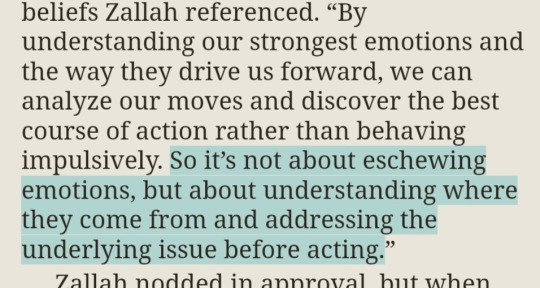
- Path of Deceit, 2022
#just tell me you won't look at anything other than what you made up#jedi order#pro jedi#path of deceit#path of deceit spoilers#not really but just in case#star wars#the high republic#jedi religion#jedi teachings
135 notes
·
View notes
Text
No Jedi is Ever Alone
The Padawan teaches the Master


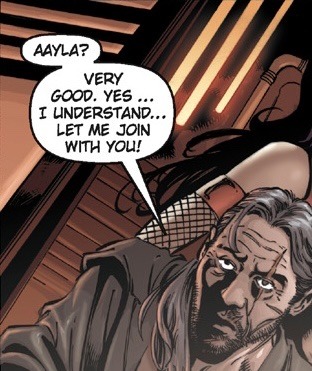



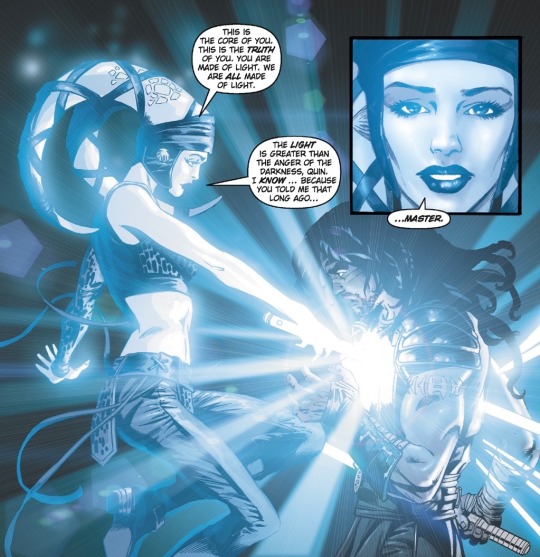
#there is no emotion#only peace#one of the best parts of their relationship#is how aayla uses the lessons she’s learned from quinlan to help him#their master padawan bond is beautiful#the best padawan and master duo#a Jedi is never alone#order 66 thoughts#quinlan vos#aayla secura#tholme#star wars#penumbra lineage#star wars comics#star wars republic: siege of saleucami#pro jedi#jedi positivity#jedi culture#jedi tradition#jedi teachings#long post
170 notes
·
View notes
Text
The Jedi Mandate
*sourced from wookiepedia.
The Code: a simplified text that would be utterly memorized by every Jedi. These are the bare bones, the simplified ideas that bind all Jedi teachings.
There is no emotion; there is peace.
There is no ignorance; there is knowledge.
There is no passion; There is serenity.
There is no death; there is only the Force.
A Jedi does not act for personal power or wealth but seeks knowledge and enlightenment.
A Jedi never acts from hatred, anger, fear, or aggression but acts when calm and at peace with the Force.
Jedi are the guardians of peace in the galaxy.
Jedi use the powers to defend and to protect, never to attack others.
Jedi respect life, in any form.
Jedi serve others rather than ruling over them, for the good of the galaxy.
Jedi seek to improve themselves through knowledge and training.
The Crystal Code
The crystal is the heart of the blade.
The heart is the crystal of the Jedi.
The Jedi is the crystal of the Force.
The Force is the blade of the heart.
All are intertwined.
The crystal, the blade, the Jedi.
You are one.
The Tenants: more specific rules to abide. Some young Jedi will not have memorized all of these, but as a knight, they should be well ingrained.
The Jedi are the guardians of civilization, yet do not allow civilization to destroy needlessly.
A Jedi uses the Force for knowledge and defense, never for aggression or personal gain.
The lightsaber is the symbol of the members of the Jedi Order.
If a Jedi ignites his lightsaber, he must be ready to take a life.
Jedi do not marry (with some exceptions), in order to avoid attachment and—according to Vergere—so as not to create dynasties of those strong in the Force.
Jedi respect each other, and all other life forms.
Jedi must put the needs of the community above the needs of individuals.
A Jedi must protect the weak and defenseless from evil.
Jedi must always cooperate in battle or crisis.
Jedi must not have wants; self-reliance must be shown.
Jedi are forbidden from ruling others.
A Jedi Master may not have more than one Padawan.
A Jedi will not kill an unarmed opponent.
A Jedi will not take revenge.
A Jedi does not cling to the past.
The Jedi do not believe in killing their prisoners.
A Jedi does not act for personal power.
Following the Code: the qualities needed in order to follow the Jedi path. These are more to do with actionable self determination and how one must conduct themselves as a Jedi. The nitty gritty stuff that many can slip up on, even the masters.
Self-discipline
Self-discipline was one of the key concepts of Jedi behavior, and Jedi Padawans were taught this from a very early age. The lessons started off similar to what might be taught to an ordinary student; however, as the student progressed, so did the complexity of the lessons.
Conquer Arrogance
"The acceptance of others is not a guarantee. Like everyone else, a Jedi is accepted or not based on his behavior. The Jedi who believes that he is more important than others only demonstrates that his opinion is to be ignored."―Dooku
Jedi were required to learn that, although they were able to use the Force, they were no better than those who could not. Jedi were taught that they were only Jedi because some had taken the trouble to teach them, not because they were superior to others, and that a Jedi Master was only a Jedi Master because he had disregarded his own sense of self-importance and embraced the will of the Force.
Conquer Overconfidence
"Overconfident thinking is flawed because the Jedi does not take all possibilities into account. He may understand the task at hand, the support of his fellows, and the ramifications of his success, and he may have even planned for unanticipated factors—but he has failed to understand his own capabilities. He has planned only for success, because he has concluded that there can be no failure. Every Jedi, in every task, should prepare for the possibility of failure."―Vodo-Siosk Baas
Many young Jedi students, while learning the ways of the Force, began to believe that they could accomplish anything. Many young Jedi died taking on tasks that were far too difficult for them, not realizing that the Force was only truly limitless to those who had limitless understanding.
Conquer Defeatism
"Try not! Do, or do not. There is no try."―Yoda
Young Jedi also learned that defeatism was just as dangerous as overconfidence. Although it might have seemed contradictory to the goals of conquering overconfidence, a Jedi would first plan for success, then for failure. Jedi who always plan for failure expected to lose, and usually only used minimal effort—enough to say that they had tried.
Conquer Stubbornness
"Do not see a lightsaber duel as a choice between winning and losing. Every duel can have many, many outcomes. When you concentrate solely on winning—in lightsaber duels as in everything else—you sully your victory. Winning becomes worse than losing. It is better to lose than to win sorely. And it is always better to end a duel peacefully than to win or lose"―Rekpa De
Jedi should always be ready to accept defeat if the cost of winning is greater than the cost of losing. Jedi were taught that it was always best to end things peacefully than to win or lose.
Conquer Recklessness
"Learn to recognize when speed is not important. Race when being first is important; move at your own pace at all other times. It is not necessary to always strike the first blow, to provide the first solution, or to reach a goal before anyone else does. In fact, it is sometimes vital to strike the last blow, to give the final answer, or to arrive after everyone else." ―Wiwa
Many young Jedi lacking in self-restraint were always ready to ignite their lightsabers and plunge straight into battle. They perceived a goal and rushed towards it, without any consideration for unseen dangers or other options. And so Jedi were taught that speed did not necessarily lead to success.
Conquer Curiosity
"Use the Force to satisfy the will of the Force—not to satisfy your own curiosity."―Odan-Urr
Many inexperienced Force-sensitives used the Force to satisfy their curiosity, probing into the business of others. Intruding gave the clear message that the Jedi felt they were above others' privacy. Jedi were taught that although using the Force to discreetly uncover the secrets of others may have been occasionally necessary, it should never become a matter of course, as it would cause great distrust of the Jedi in general.
Conquer Aggression
"A Jedi uses the Force for knowledge and defense, never for attack."―Yoda
A sizable number of Jedi, in training, confused the meanings of attack, defense and aggression. Thus Younglings were taught that it was possible for a Jedi to strike without aggression, so long as they acted without recklessness, hatred or anger. A Jedi was permitted to kill in self-defense—only if there was no other option. However, Jedi instructors taught their students that killing, no matter what the circumstances, was not to become commonplace. To conquer aggression, even in combat, a Jedi must have explored every other option, including surrender, before resorting to using lethal force. Jedi who depended on murder were close to the Dark side of the Force.
Conquer External Loyalties
"A Jedi is a Jedi, first and foremost, and only. For a Jedi to divide his attention between the will of the Force and the will of others is to invite disaster."―Hoche Trit
Each Jedi was expected to remove as many external distractions from his or her life as possible. For that reason, the Order only accepted potential Padawans while they were still young children; they were too young to have already formed strong relationships and forbidden them forming attached relationships later in life. Jedi were not allowed to marry without special dispensation, like in the case of Cerean Jedi Ki-Adi-Mundi, who was allowed to marry several Cerean women because of his people's low birth rate. Jedi were forbidden from taking a political appointment or to accept gifts. They were taught that their loyalty was to be to the Jedi Order, and to nothing else.
Conquer Materialism
"I wear my robe so that I am warm; I carry my lightsaber so that I am safe; and I keep enough credits for my next meal, so that I am not hungry. If the Force wants me to have more, it finds a way of letting me know."―Kagoro
A Jedi typically carried only essential belongings. Jedi were forbidden from keeping more than a few essential belongings. There were two reasons for this; first because they distracted a Jedi from the Force, and second because, as they emerged through the ranks, Jedi were required to leave for missions with extremely short notice, and so having many objects was a burden. It was rare for a Jedi to possess more than they could carry on their person at one time.
Responsibility
Once a Jedi had mastered self-discipline, they could begin to accept responsibility for their actions. Jedi who shunned responsibility were never trained, and Jedi who embraced it were never denied training.
Practice Honesty
"Let there be truth between your heart and the Force. All else is transitory."―Surenit Kli'qiy
Honesty was the first responsibility that aspiring Jedi were taught. Jedi were permitted to stretch the truth if the situation required it of them, however this was to be done as sparingly as possible. An honest Jedi was always truthful with himself, his Master, and the Council.
Honor Your Promises
"Deliver more than you promise. The best way to be always certain of this is to deliver much, even when you promise nothing."―Tho-Mes Drei
Jedi were taught that if they made a promise, they should have always been prepared to keep it, or else to have made amends. Thus, a Jedi should never have made a promise he or she was not certain they could keep. Jedi were encouraged to consult their Master before making a promise.
Honor Your Padawan
"You, Young Padawan will know your place! "―Obi-Wan Kenobi
A Jedi Master was required to know that he must treat his Padawan with respect. He should never reprimand his Padawan in public, nor punish his Padawan for disagreeing with him, such as when Obi Wan Kenobi said the above quoted line to his Padawan for disagreeing with him. An act which resulted in even George Lucas described his approach as "harsh" in the movie commentary.
On the other hand, a Master should praise his Padawan, especially in the presence of others. This built the Padawan's confidence, and strengthened the bond between Master and apprentice.
Honor Your Master
"I'm sorry for my behavior, Master. It's not my place to disagree with you about the boy. And I am grateful you think I'm ready to take the trials."―Obi-Wan Kenobi to Qui-Gon Jinn
By the same token, Padawans were expected to show great respect to their Masters, especially in front of others. Padawans were taught never to disagree with their Masters to the point of argument, and that when they were in discussion with others, Padawans should only address their Masters when they had been addressed themselves. This spared the Master having to apologize for his Padawan's behavior.
Honor the Jedi Council
"Now must I keep the word I made when only a Jedi Knight I was—a promotion this is not."―Master Yoda after being invited to join the Jedi High Council
Although the Jedi High Council was the ultimate authority of the Jedi Order, it was not possible for the High Councilors to be everywhere at once. Therefore, when the Council sent a Jedi on a mission, the Jedi spoke for and was a representative of the Jedi Council. The Council was forced to answer for the Jedi's words and answers, and so the Jedi would have been careful not to put the Council in a difficult position, as to do so would be to show terrible disrespect for the Council.
Honor The Jedi Order
"When a Jedi behaves badly in public, an observer might think, 'If this Jedi is a representative of the whole Order, then plainly no Jedi is worth respect.' On meeting a second Jedi, who behaves better than the first, that same person might think, 'Does this say that half the Jedi are good, and half bad?' On meeting a third Jedi, who behaves as well as the second, the person thinks, 'Was the first Jedi an exception, then?' In this way, only by the good behavior of several Jedi can the public be certain that the poor behavior of one Jedi was unusual. Thus, it takes many Jedi to undo the mistakes of one."―Odan-Urr
Every action a Jedi made reflected on the Order. Good deeds boosted the Order's reputation, but poor behavior sometimes caused incurable damage. Jedi were taught to remember that each person they met might not have set eyes upon a Jedi before, and that the acts of the particular Jedi that person would influence their perception of the Jedi Order as a whole.
Honor the Law
One of the most important roles of the Jedi was to protect the peace and justice of the Republic, and so no Jedi was above the law. Jedi were expected to follow the law the same as they expected others to. Jedi were permitted to break laws, but only when it was required, and only if they were willing to suffer the consequences…
Honor Life
Jedi were expected never to commit murder, for any reason. However, if confronted with a life-or-death struggle, a Jedi was permitted to kill to complete their mission. This act was not encouraged, as ending life strengthened the dark side; however, if the act was justified—if it saved others' lives, or if the Jedi was acting on the will of the Force—then the light side was equally strengthened. Jedi were also expected to think of those they had killed, and to think of the suffering caused by their deaths. A Jedi who did not care about his victims was on the path to the dark side.
Public service
Although the Jedi existed to serve the Force, they were funded by the senate because they served the public interest. If Jedi were unable to use the Force, they would continue to serve, because that was their duty. The fact that the Force was real, and that the Jedi were its most prolific and devoted practitioners, only strengthened their resolve to use it for good.
Duty To The Republic
Although the Jedi and the Republic were dissimilar, and the Jedi Order had no authority over the Republic, the Jedi served the Republic, and were expected to uphold its laws and ideals, and to protect its citizens. However, members of the Order held no rank in Republic hierarchy, and only served when asked; at all other times they stepped aside. This strange agreement between the two parties had stood for so long that no one knew how or why it had come about.
Render Aid
Jedi were obliged to help those in need of aid whenever possible, and were expected to be able to prioritize quickly. Jedi were taught that while saving one life was important, saving many lives was even more so. This principle did not mean a Jedi had to abandon other goals in every circumstance, but merely that a Jedi must do his or her best to make sure that they aided those who were most in need of assistance.
Defend The Weak
Similarly, a Jedi was expected to defend the weak from those who oppressed them, ranging from small-scale suffering at the hands of an individual to large-scale enslavement of entire species. However, Jedi were taught to remember that all may not have been as it seemed, and that they should respect other cultures, even if they clashed with a Jedi's moral or ethical code. Jedi were also warned not to act in areas out of their jurisdiction, and to always consider the consequences of their actions.
Provide Support
At times, it was necessary for a Jedi to stand aside and let other people defend the weak, even if the Jedi felt that they could do a superior job. Jedi were taught that they should assist by word or action as required by the situation, offering advice when requested to, warning when necessary, and arguing only when reason failed. Jedi should remember that they wielded the marvelous tool of the Force, and that they should be prepared to use it only for good.
#jedi code#jedi teachings#from wookiepedia#legends#just for anyone who might want this#and for my own reference#notes#refs#next i will have to do one that is strictly anakin's interpretations etc.#ref#star wars rp
15 notes
·
View notes
Video
youtube
For all the Star Wars dudebros who keep hating on the Obi Wan Kenobi show.
#starkeeper podcast#podcast#star wars podcast#kindess#my post#obi wan kenobi#moses ingram#be kind#star wars#kenobi series#kenobi#yoda#jedi teachings#gffa#jedi philosophy
1 note
·
View note
Note
Why I feel like Cal would make the best cookies for the younglinglings and padawans? (Thats canon for sure)
maybe you're right, maybe greez finally forced that boy into the kitchen and after like 20 years Cal can make good food that isn't a store-bought turbo dog
#i love how many interactions there are of 'cal can't cook' in js#like there's the early greez ones in the kitchen (including the U DIDNT USE ANY SPICES?? EVER??? one)#and the one like 'i saw what cere ate i do NOT trust ur jedi definition of food'#the cutest one is kata one where she's like greez is teaching me to cook!!!! can u cook? and cal is like uhhhh#thanks for the ask!#side note i love kata and greez so so so much
143 notes
·
View notes
Text
I'd love more exploration of Rex perhaps feeling like he got kind-of the short end of the stick in terms of Jedi. He LIKES Ahsoka, for sure, she's got a spirit he admires and she's tenacious and it's hard not to care for her. And Anakin is, well, powerful for sure and friendly enough, so for a while Rex thinks he came out pretty well with his Jedi.
But then he starts meeting other Jedi or working alongside other Jedi and he realizes how much more competent other Jedi often are, especially the more experienced ones. And while Anakin is friendly enough, he's seen a lot of the other clones have MUCH closer relationships to their Jedi and certainly none of THEM ask their captains or commanders to lie to superior officers about secret relationships or unsanctioned missions. He's a little surprised once when he notices pretty much every other Jedi remembers that the clones can't always keep up with the Jedi and will unhesitatingly adjust their battle strategy to accommodate it. He sees the way other young Padawans are being taught to do something similar, to really consider the lives of the clones when they're in battle as the higher priority rather than the success of the mission.
And Rex starts wondering what his life might be like if he had ended up with a different Jedi. He loves his men, he's proud of the work they do most of the time, and he doesn't DISLIKE the Jedi he ended up with, but sometimes he's kind-of jealous of some of his brothers and wishes he'd gotten their Jedi instead.
#star wars#captain rex#anti anakin#anti anakin skywalker#anakin critical#anakin skywalker critical#and then he meets kanan and ezra in rebels and realizes he finally got exactly what he always had secretly wished for#he's got a real jedi now#he's got one of the GOOD jedi now#as much as kanan doesn't really trust rex yet he still came back to save the clones from the empire#and that one moment tells rex more than anything else kanan says or does#anakin never would've done that#he never would've come back to save someone he didn't trust and didn't like#not without an ulterior motive anyway#anakin would've considered their deaths an unfortunate tragedy probably#but that it was more important to get his own people to safety#kanan chose to turn around and put his life on the line instead#and so teaches his padawan to do the same#because all life is precious. even if you don't understand it or don't like it. ESPECIALLY if you don't understand it or like it.#so rex chooses to follow kanan#because he didn't get to choose his jedi before this#he wouldn't have chosen anakin if he'd HAD a choice probably#but he gets to choose now#and he didn't WANT to be a soldier again#but kanan came in and inspired him and reminded him of that long ago wish he once had to follow a jedi he truly respected#and so he chooses kanan now the way he never chose anakin
287 notes
·
View notes
Note
As a Buddhist, does it frustrate you when the anti-Jedi crowd demonize their teachings and philosophy because those “criticisms” most likely come from a Western POV.
Well, luckily, I wouldn't say that there is a "crowd," but it's true that there is a group that has a very narrow point of view.
And it makes me sad is that there are some people who wouldn't want to acknowledge that the Jedi teachings in George Lucas' Star Wars are actually depicting Buddhist psychology. Because the lessons on non-attachment, compassionate love, on peace with impermanence and the techniques to regulate negative emotions, the emphasis on being mindful about your emotions, the nuanced examination of the nature of good and evil, and of what constitutes a meaningful life... these are all helping us to live better, to solve our problems, to be kinder and be more loving, and to be happier.
People are actively obscuring and preventing the spread of these lessons, this content by trying to twist them into things like toxic masculinity, emotional repression, sexual repression, fleeing from reality, binary thinking, bigotry etc. And mostly, they're doing this because they want to talk about toxic masculinity, emotional repression, sexual repression, fleeing from reality, binary thinking, bigotry etc., so their intentions are not bad, but what they're doing is counterproductive. It makes it harder for people to get the potential antidotes for those issues, even as they're carried in one of the most popular stories on Earth. So, they need to be less offended and more committed, less distrustful and more careful and mindful.
37 notes
·
View notes
Text

BAH HA HA HA HA
“IMPOSSIBLE FOR THE HUMAN RACE”
Then tell my how there are people on earth who practice non-attachment??!!
Yeah ok, you’ve seen Star Wars, but if you knew anything about it you would know that George Lucas based the Jedi’s religion on REAL LIFE RELIGIONS!!! THAT REAL PEOPLE PRACTICE!!! Is it hard? Yeah! But there’s this little thing called discipline. Which the Jedi also practice.
Also
Many of the Jedi… aren’t human??
And even those who are human almost could be classified as a different species. They have the force! They are mentally, emotionally, and metaphysically connected to the universe! Stop treating them like they’re just normal!
#star wars#pro jedi community#pro jedi council#pro jedi order#pro jedi#jedi love#jedi positive#Jedi defense#Jedi#jedi philosophy#jedi teachings#george lucas
3 notes
·
View notes
Text
Sometimes I just remember that oh right it's apparently a slightly controversial opinion that I think if Palpatine hadn't been involved at all that Anakin could've been perfectly happy and fulfilled with the Jedi.
Like just from rots we see Anakin want to follow Jedi ideals, to seek advice and even help from the very Jedi that fandom loves to act like he hates and who hate him in return, and we see the Jedi around him actually have a lot of respect for him! But every time he makes progress Palpatine is whispering in his ear and pulling out the stitches and re-opening the wounds, making it near impossible for him to actually grow as a Jedi and instead he grows closer to Falling. Not to mention the war, which was orchestrated in part to actively challenge the Jedi's morals and make them make bad and questionable choices.
Plenty of Legends canon and even current canon in things like the marvel comics show Anakin actively wrestling and considering Jedi philosophy, the pros and cons, and working through all his trauma and trying to figure out what's right for him and what the Jedi code actually means. People act like he only ever does lightsaber training and that he never picked up a book in his entire padawanship (which not only is just not how the Jedi Order works from what we see but honestly is just a boring take on the character imo).
Like, I just don't think that Anakin is actually incompatible with the Jedi Order! I think he could've thrived there if he wasn't being actively sabotaged and also had more time.
#anakin skywalker#jedi positive#pro jedi#anyway i also dont think that the jedi order is incompatible with romance just that anakin has trauma about#his interpersonal attachments and that he didnt get a great teaching on it in canon bc obi wan needs therapy#nd so never really discussed it with anakin#which is not necessarily a shot at obi wan i just think that entire lineage has communication issues lmao#like obi wan has both trauma and oin legends actual healthy relationships and exes he no longer dates#who were jedi!#but like he doesnt actually discuss this with anakin?#and tbh thats the most canon to me lmao obi wan just doesnt realize he needs to talk about it or maybe how?#anakin#sw meta#sorta lmao#jedi order
166 notes
·
View notes
Text
"And who were you," Zan asked, "before you became part of the Order?"
She hesitated as well before replying. "No one. I was brought to the Temple as an infant."
"Have you never tried to contact your parents, to find your homeworld’s-"
Barriss looked away. "I was born on a liner in deep space. My parents’ identities are unknown. I call no world save Coruscant my home."
Zan said softly, "My apologies, Padawan Offee. I didn’t mean to pry." She turned back and smiled at him. "It is I who must apologize. There is no excuse for rudeness. As Master Yoda says, ’If in anger you answer, then in shame you dwell.’"
—Medstar I: Battle Surgeons, Michael Reaves
4 notes
·
View notes
Photo
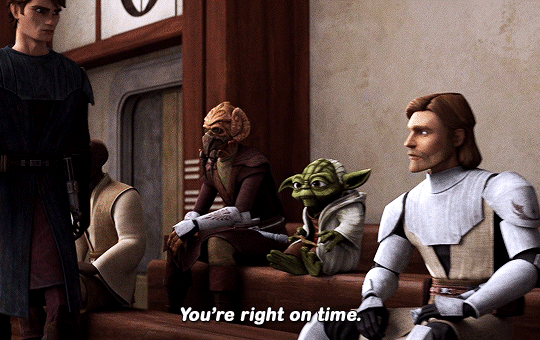

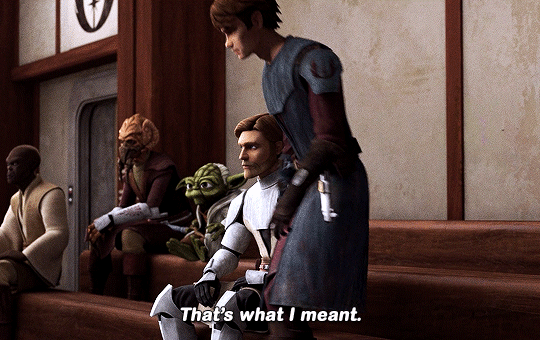

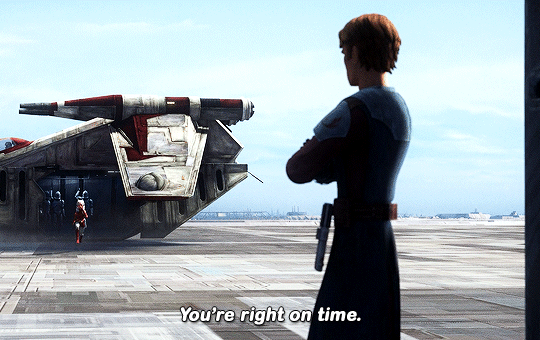

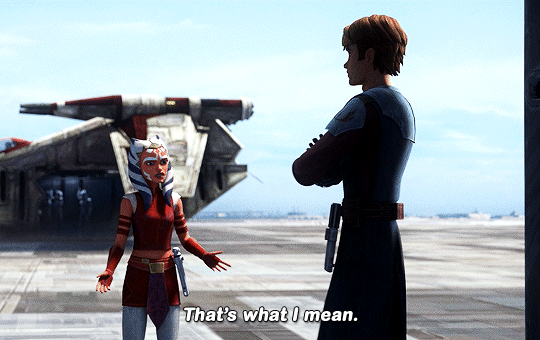
Obi-Wan, Anakin and Ahsoka in Tales of the Jedi: “Practice Makes Perfect”
#swedit#totjedit#star wars#tales of the jedi#anakin skywalker#obi wan kenobi#ahsoka tano#disaster lineage#starwarsfilms#starwarsblr#userconstance#usermelanie#userkosmos#tuserhanna#userjasmine#userragna#underbetelgeuse#gifs#*#i see obi-wan was not only teaching anakin the ways of the jedi but also the ways of the sass master
1K notes
·
View notes
Text
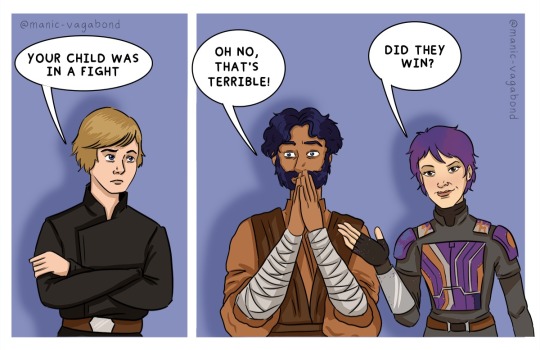
Based on this post! @sleepingbeauty21
#this took me wayyyy longer than i intended lol#decided to give ezra some jedi robes#headcanon that he and sabine teach a class together at lukes jedi acdemy#my art#star wars#luke skywalker#ezra bridger#sabine wren#comic
142 notes
·
View notes
Text
Trying to think of Jedi things Obi Wan could do with a 9 year old apprentice in tow and my first thought is teaching. I invite you all to consider with me newly knighted Obi Wan and his teeny tiny TA leading classes to jedi pre-schoolers. Teeny tiny TA Padawan Anakin at Obi Wan's guest lecture series at Alderaan's University scribbling his own notes on geo-politics and relief programs in between operating the slide projector
#every day is take your kid to work day when you're a jedi with a young padawan#little ani is so mad too#he wants action. swordfights. adventure#but nooo he's gotta teach#anakin skywalker#obi wan kenobi#obie wan and anakin#jedi
590 notes
·
View notes